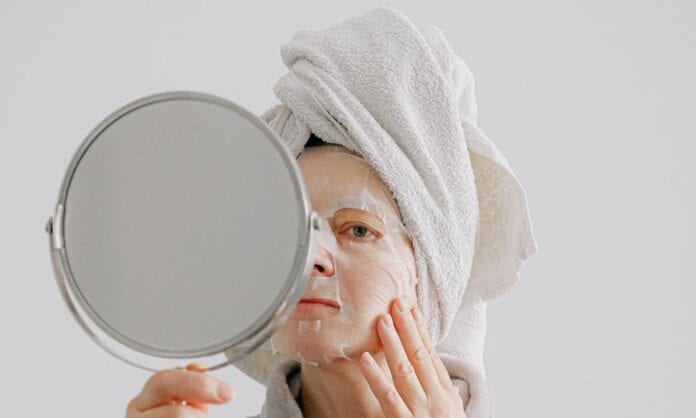From why you’re breaking out, to what your skincare routine should look like
Since the coronavirus pandemic hit, many of us have experienced stress, anxiety, and changes to our daily routines, all of which contribute to throwing our skin balance off. In fact, people worldwide are looking for new ways to improve their skincare routine, with Google searches for ‘skincare’ increasing by 40% since the start of lockdown.
While it’s common practice to rely on Googling our skincare symptoms or investing in a miracle product advertised on social media, the team at OTTY Sleep has asked a selection of top skincare experts for their best overnight tips and tricks for maintaining healthy skin whilst self-isolating.
Six steps to improving your nightly skincare routine
- Use at-home light therapy
At-home LED light therapy is an excellent addition to any nighttime routine, as it calms areas of irritation while brightening the skin. The skin uses the light as a source of energy to repair and rejuvenate the damaged cells and helps to kill bacteria build up. The light therapy system promotes collagen and elastin production, helps boost circulation, and accelerates damaged tissue repair.
There are two main kinds of light therapy used for treating acne, blue light, and red light. Each having its own benefits for the skin. Blue light has an antimicrobial effect, which kills bacteria found within the pores and oil glands on your skin. Whereas red light therapy helps stimulate healing and works effectively to reduce acne scarring.*
- Get an air purifier
While people worldwide practise social distancing measures, our skin faces the challenge of poor home ventilation. There is a link between low air quality and skin irritation, with recent studies proving exposure to high levels of pollutants has a profound negative impact on our skin.
By adding an indoor air filter to your sleeping space, you can reduce the amount of bacteria growth caused by poor quality air, which will help you reduce acne and breakouts. Another benefit of an air purifier in your home is that it can reduce the signs of ageing on your skin. As pollution in the surroundings can cause permanent damage.
- Find the perfect cleanser
Whether you wear makeup or not, nighttime cleansing is essential for removing the build-up of dirt, dead skin cells, excess oil, and products. With age, your pores’ size widens, which means dirt has a greater chance of collecting and causing blackheads and pimples. That’s why it’s important to cleanse at night to prevent your skin from suffocation.
When choosing a cleansing wash, you shouldn’t just grab any old product off the shelf. You need to tailor it to your skin concerns to get the best results from it.
- Cut moisturiser out of your nightly routine
We once believed that moisturiser is essentially the cornerstone of a solid evening skincare routine. But according to Cosmetic Doctor, Dr Rekha, over-the-counter products simply sit on the surface and don’t treat or hydrate your skin. Instead, Rekha recommends using a topical medication product such as ZO Skin Health Hydrating cream to prevent itching and cracking while hydrating your skin.
- Don’t over-exfoliate
Your skin’s natural barrier helps to protect and retain moisture. While exfoliating your skin before bedtime can leave your skin feeling fresh and smooth, excessive scrubbing can strip your skin of natural oils. Dr Rekha suggests exfoliating only once or twice a week and trying a chemical exfoliation over a facial scrub to really see the benefits and improve skin tone.
- Use eye-cream before bedtime
Eye cream is a crucial skincare step at nighttime, one that you shouldn’t skip no matter how old you are. You must keep the delicate skin under the eyes moisturised and hydrated to prevent the look of tiredness, shadows, and wrinkles.
Dr Rekha says, even if you aren’t showing visible signs of ageing around the eyes, the skin around that area is thinner and more delicate than the rest of your face, so it tends to show ageing first. So using an eye cream to help stave off the signs is always a good idea before bedtime.
Why is your skin breaking out during lockdown? We asked the experts…
Despite the fact we’re all going make-up free, we seem to be facing more skincare problems than ever before, with search volume for ‘Why am I breaking out?’ up 117% in the past year.
Many factors are influencing the growing concerns for skin care across the nation. But the main culprits come down to stress, lack of vitamin D and hygiene.
During this time of uncertainty, stress and hormones have been among the biggest triggers of acne breakout. Skincare specialist Khatra Paterson explains, “Stress hormone Cortisol increases when anxiety levels are high affecting our blood sugars. Increased blood sugars reduce and destroy collagen and elastin production in our skin.
As we begin to lose our collagen and elastin, this results in signs of ageing. We must keep our skin hydrated and promote collagen production to avoid these early signs of ageing and adverse effects caused by stress.
As cortisol increases, so does oil production within our skin. It is very common for people who have oily skin or suffered from acne previously to have a breakout when they are stressed.”
Dr Rekha Tailor cosmetic specialist says that our home environment and lifestyle habits could be causing breakouts, “The fact that we are spending more time at home means that our skin is spending longer in a centrally heated environment which dries out the skin.
Our diet and lifestyle have also changed significantly, meaning that most people are consuming more sugar and alcohol than previously, all of which harm the skin.”
Mask acne (Maskne) is a problem many people have faced over the past year. Khatra offers her insight on why wearing a mask is having such a negative impact on our skin “The build-up of moisture creates the perfect breeding environment for bacteria to proliferate. Ill-fitting masks can also cause friction on the skin. Friction and irritation on the skin can cause small lacerations which can lead to dermatitis.
Medical Aesthetician Mamuna Arshas recommends adapting your skincare routine to help overcome the effects of working a mark daily. “Maintaining a good cleansing and toning skincare regime is essential whatever the season, with or without a mask.
With more bacteria trapped on the skin’s layer when wearing a mask, double cleansing (washing your face with two cleansers, oil-based and then water-based) is the best way to ensure your face is as clean as possible.”
*We recommend speaking to your GP or a dermatologist before using LED light therapy, as it can be harmful to certain skin types.
Further information can be found by clicking here: http://otty.com/
Another helpful tool can be found by clicking here: https://www.livsmooth.com/

| [donate]
| Help keep news FREE for our readersSupporting your local community newspaper/online news outlet is crucial now more than ever. If you believe in independent journalism,then consider making a valuable contribution by making a one-time or monthly donation. We operate in rural areas where providing unbiased news can be challenging. |

















